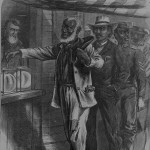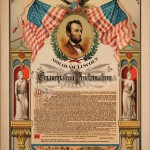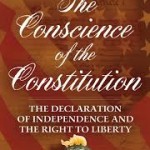The Civil War had been won by the North, but there was still much to do, as both legal and extra-legal means were used to prevent freed slaves from voting. Between the end of the Civil War in 1865 and 1870, the US Constitution was amended three times. The Thirteenth, Fourteenth and Fifteenth Amendments are collectively known as […]
Constitutional Question Resolved For a Pay Raise
On April 4, 1841 William Henry Harrison became the first United States president to die in office. The Constitution did not address critical questions regarding succession and the status of Harrison’s Vice-President, John Tyler. Tyler would act to resolve one of the issues, apparently for personal, not constitutional reasons. Lack of Constitutional Clarity The Constitution’s […]
US Constitution’s Twelfth Amendment: Correcting a Founding Error
The Founders’ recognition of human failings drove creation of many constitutional institutions. Powers were separated and sovereignty divided to protect against human tendencies to accumulate power. Most institutions were designed with the flaws of humanity in mind. The Founders ignored these considerations of human nature in some instances and the results were mistakes. Among the mistakes was the system […]
US Constitution’s Twenty-Seventh Amendment: 202 Years in the Making
The First Freedom of the First Amendment is the Freedom of Religion. The Right to Bear Arms is famously in the Second Amendment. The American Bill of Rights has an almost majestic quality by being composed of ten amendments, recalling the structure of the Ten Commandments. But the 1789 Congress submitted twelve amendments drafted by […]
US Constitution’s Thirteenth Amendment: Legal Abolition of Slavery
Abraham Lincoln issued The Emancipation Proclamation on January 1, 1863 freeing many slaves. Its scope was limited and its true legality unclear. Lincoln had freed the slaves in areas of rebellion with an executive order. His constitutional authority to do this was in question. For slavery to be abolished with certainty in the United States, a constitutional amendment was […]
Book Review: The Conscience of the Constitution
I recently was fortunate to observe Tim Sandefur argue the unconstitutionality of Obamacare in the District of Colombia Court of Appeals under the Origination Clause.1 Following the arguments a symposium on the Origination Clause was held at the Cato Institute. After the symposium I met Mr. Sandefur and was introduced to his new book, The Conscience of the Constitution: The Declaration of Independence and the […]
The Constitution’s Sixteenth Amendment: Result of Political Miscalculation
When April 15th rolls around as they labor toward the filing deadline for income taxes, Americans would be forgiven if they were to become nostalgic about Patrick Henry’s opposition to the Stamp Act of 1765 and his call for the death of the King[1] because of a required government stamp on most documents in the […]
The Fifth Amendment Guarantee Against Double Jeopardy
The US Constitution‘s Fifth Amendment requires government procedures to protect the natural, inalienable rights of life, liberty and the pursuit of happiness recognized in the Declaration of Independence. Among these protections is a limit on multiple prosecutions based upon the same alleged conduct. This limitation is commonly referred to as a protection from “double jeopardy”. The Double […]
The Fifth Amendment’s Grand Jury: A Proud & Lost Protection of Liberty
The Fifth Amendment of the Bill of Rights mandates government procedures to protect the natural, inalienable rights of life, liberty and the pursuit of happiness recognized in the Declaration of Independence. The amendment contains five protections for these natural rights. The Fifth Amendment’s first protection requires the federal government to use a grand jury to […]















A Return to American Greatness, by Michael J. Dreikorn, Ed.D.
America was founded upon the principles of State sovereignty and individual rights. Citizens have rights, and powers are delegated to various governmental entities, by citizens. The role of the federal government is simply to provide for national security, and interstate commerce and safety. In the past century, the role of the federal government morphed from what was […]